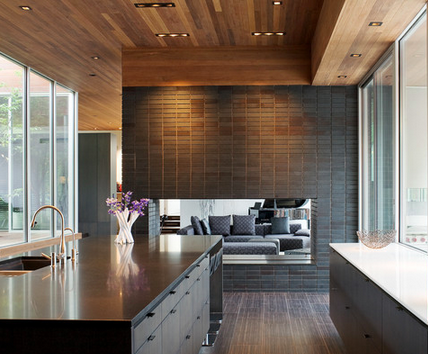Ah, trends.
Trends are powerful enough to shape the world we live in — the cars we drive, the houses we buy, the phones we use. But its not only because of their viral or popular nature that we choose to adopt them. Trends often involve a changed appearance (style) of an object, but more importantly (and permanently), trends have the ability to evolve the function of an object. These are the trends we look for at Aterra — the next steps in “design evolution,” so to speak. And as our roots are in lighting design, we haven’t been able to help but notice the latest trend in recessed lighting — the modern square trim.
 Contemporary hallway setting for 3 square-trim lights
Contemporary hallway setting for 3 square-trim lights
DESIGN ASPECTS

For the past few decades, recessed lighting trim has not changed much stylistically. After choosing the size of the trim, you have a few styles of trim to choose from — baffle, reflector, adjustable, lensed, wall-washed, or decorative. And although these may vary in function, they share the same shape. Until now, design evolution hasn’t changed very much at all.

Square trim has had its popularity in commercial lighting, which is a great sign because once a trend is accepted in the commercial lighting design world — museums, restaurants, retail — they usually begin integrating into residential lighting design. As we can see in these examples of square trim, it undoubtedly adds a contemporary, modern, and even minimalist touch to the lighting of the room. This new edgy trend in trim has us thinking that it will be sticking around for a while!
5 Reasons Square Trim is a Trend That’s Here to Stay
When it comes to choosing recessed lighting, there are many factors to consider. However trims are visually the most important part of recessed lighting, as they are the only visible part.
So whatever recessed lighting you choose, there is a square trim to fit, for that ultra modern edge. We visited waclighting.com to check out some of the square trim options currently widely available.

1) Square trim comes in different sizes. Like other trim options, square trims comes in a variety of size options and are able to fit almost any light source. The most popular ones are the smaller 3-4 inch varieties, as well as the larger 8-9 inch varieties.

2) Square trim is adjustable. A great feature of square trim is the very sleek adjustable option, which is perfect for spotlight functions with the added flexibility of being able to adjust to any space within the angle. A popular option is the 30-45 degree adjustable (pictured on the right).

3) Square trim has multiple spot options for purposeful lighting. Available in single, double, triple, even quadruple spots, the multi-spot square trim is our favorite part of the square trim trend. Multi-spot square trim not only looks clean and modern, but can be used for task lighting, highlighting unique architecture in any space, wall and artwork lighting, and any other at home activities that require a little extra illumination. Including the shower (pictured on the right). The functionality of the multiple-spot square trim is limitless, and this added value is a huge plus for today’s modern home.

4) Square trim is available for most light sources. LED, low voltage, line voltage, and metal halide being the most used, the trim is available for a variety of light sources used in the home. 5) Square trim has an aesthetically pleasing modern look. A look that just can’t be duplicated with traditional trim. The clean lines and subtle contemporary feel that the modern square trim adds to the space is a look consistent with popular home decor and design of the 21st century.

Combined with it’s availability, adaptability, and heightened functionality, Aterra names square trim the product of the month, and the next step in the design evolution of recessed lighting trim.
Specs Sheet: Square Wall Wash
Click here for detailed PDF
3.5″ Tesla LED
0° – 30° Adjustable
- Power: 21.5W
- Delivered Lumens: Up to 1070
- Comparable to: 75W MR16
- ELV Dimming: 100% – 15% (120V Only)
- 0-10V Dimming: 100% – 10%
- Rated Life: 50,000 hours
- 3.5” aperture
- Adjustable fixtures are ideal for sloped ceiling applications
- Universal input voltage (120V-220V-277V)
A Case Study in Product Design Evolution:
The Evolution of the TV Set
 The first mechanical tv ever available to the masses was a tv built in the UK, called the Baird “Televisor.”
The first mechanical tv ever available to the masses was a tv built in the UK, called the Baird “Televisor.”
 Electronic tv’s were the next step in design evolution and technology, becoming popular by RCA and eventually replacing mechanical tv technology.
Electronic tv’s were the next step in design evolution and technology, becoming popular by RCA and eventually replacing mechanical tv technology.
 Color capable tv’s came out in the last years of the 40s and early 50s. By 1950 there were about 6 million tv sets in the US.
Color capable tv’s came out in the last years of the 40s and early 50s. By 1950 there were about 6 million tv sets in the US.
 By the early 1960s there were over 60 million tv sets in the US, with dozens of competitors including Meidensha, a Japanese brand.
By the early 1960s there were over 60 million tv sets in the US, with dozens of competitors including Meidensha, a Japanese brand.
 Color tv’s are a standard household appliance by the 1970s.
Color tv’s are a standard household appliance by the 1970s.
 The best tv technology and clearest image display of the 20th century, included popular brands like Sony.
The best tv technology and clearest image display of the 20th century, included popular brands like Sony.

The flat screen emerges, and hi-def tv’s are the game changing the trend in the design evolution of the tv
A few years away from digital tv, 3D tv, and curve tv’s.





